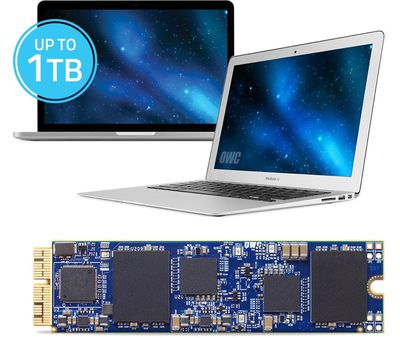OWC Announces Aura Flash Storage Upgrades for Mid-2013 and Later Mac Laptops
Other World Computing today announced a new product that will allow newer Retina MacBook Pro and MacBook Air owners to upgrade the storage in their notebooks for the first time.
Aura SSD upgrade kits are available in 480GB and 1TB capacities and will work with the Late-2013 Retina MacBook Pro and newer and the Mid-2013 MacBook Air and newer. At up to 1TB of storage, a Retina MacBook Pro or MacBook Air can gain up to 8x the capacity of the standard 128GB hard drive that comes with lower-end models. 1TB also exceeds the maximum factory drive available in the MacBook Air, which is limited to 512GB.

According to OWC, its Aura PCIe-based flash storage is designed using high-quality components that are fully compatible with Mac notebooks.
Tier-1 Flash - Aura SSDs use only top-rated flash for amazing performance and dependability.
Superior Error Correction - Three-level error correction with low-density parity checks provides significantly improved reliability, and RAID-like protection for your data.
Cell-Level Data Refresh - Aura's powerful embedded processor monitors and re-writes data blocks as needed to maintain correct charge at the cell level, improving the integrity of your data and extending the life of your drive.
Global Wear-Leveling - A global wear-leveling algorithm helps evenly distribute data across your SSD cells, extending the life of your drive by preventing any section of flash from getting worn out prematurely.
Upgrade kits include all of the tools that are necessary to replace the solid state drive in a Mac notebook, and it also includes an OWC Envoy Pro drive enclosure to house the existing factory drive in the Retina MacBook Pro or MacBook Air, so it can be used as an external SSD.
OWC's 480GB Aura SSD Kit (with enclosure) is available for $399, with a standalone drive priced at $347.99. The 1TB Kit is priced at $649, with the 1TB standalone drive available for $597. Both drives are available from the OWC website and will begin shipping out at the end of March.
Popular Stories
Apple's next-generation iPhone 17 Pro and iPhone 17 Pro Max are less than three months away, and there are plenty of rumors about the devices.
Apple is expected to launch the iPhone 17, iPhone 17 Air, iPhone 17 Pro, and iPhone 17 Pro Max in September this year.
Below, we recap key changes rumored for the iPhone 17 Pro models:Aluminum frame: iPhone 17 Pro models are rumored to have an...
The long wait for an Apple Watch Ultra 3 appears to be nearly over, and it is rumored to feature both satellite connectivity and 5G support.
Apple Watch Ultra's existing Night Mode
In his latest Power On newsletter, Bloomberg's Mark Gurman said that the Apple Watch Ultra 3 is on track to launch this year with "significant" new features, including satellite connectivity, which would let you...
The upcoming iPhone 17 Pro and iPhone 17 Pro Max are rumored to have a slightly different MagSafe magnet layout compared to existing iPhone models, and a leaked photo has offered a closer look at the supposed new design.
The leaker Majin Bu today shared a photo of alleged MagSafe magnet arrays for third-party iPhone 17 Pro cases. On existing iPhone models with MagSafe, the magnets form a...
iOS 26 and iPadOS 26 add a smaller yet useful Wi-Fi feature to iPhones and iPads.
As spotted by Creative Strategies analyst Max Weinbach, sign-in details for captive Wi-Fi networks are now synced across iPhones and iPads running iOS 26 and iPadOS 26. For example, while Weinbach was staying at a Hilton hotel, his iPhone prompted him to fill in Wi-Fi details from his iPad that was already...
The iPhone 17 Pro Max will feature the biggest ever battery in an iPhone, according to the Weibo leaker known as "Instant Digital."
In a new post, the leaker listed the battery capacities of the iPhone 11 Pro Max through to the iPhone 16 Pro Max, and added that the iPhone 17 Pro Max will feature a battery capacity of 5,000mAh:
iPhone 11 Pro Max: 3,969mAh
iPhone 12 Pro Max: 3,687mAh...
Apple today seeded the second betas of upcoming iOS 18.6 and iPadOS 18.6 updates to public beta testers, with the betas coming just a day after Apple provided the betas to developers. Apple has also released a second beta of macOS Sequoia 15.6.
Testers who have signed up for beta updates through Apple's beta site can download iOS 18.6 and iPadOS 18.6 from the Settings app on a compatible...
Apple is developing a MacBook with the A18 Pro chip, according to findings in backend code uncovered by MacRumors.
Subscribe to the MacRumors YouTube channel for more videos.
Earlier today, Apple analyst Ming-Chi Kuo reported that Apple is planning to launch a low-cost MacBook powered by an iPhone chip. The machine is expected to feature a 13-inch display, the A18 Pro chip, and color options...




















